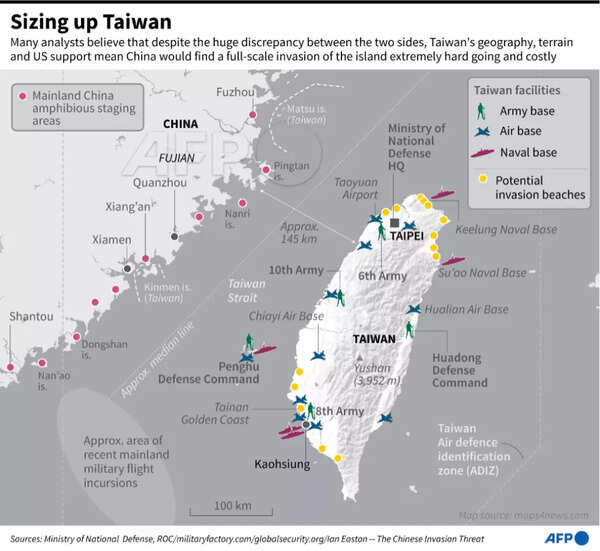China had threatened “serious consequences” if US House Speaker Nancy Pelosi landed in Taiwan.
Disregarding all the warnings, Pelosi landed in Taiwan and on Wednesday met President Tsai Ing-wen. “Today, the world faces a choice between democracy and autocracy … America’s determination to preserve democracy, here in Taiwan and around the world, remains ironclad,” she said in a short speech during the meeting.
The visit has left China humiliated and angry.
Here are some steps Beijing has already taken:
Military drills
Beijing has announced six exclusion zones encircling Taiwan to facilitate live-fire military drills from August 2-4. Some of the areas cross into the island’s territorial waters, threatening to disrupt airline traffic and shipping in the Taiwan Strait — one of the world’s busiest trade routes.

The operations will include “regular-guided fire testing in the eastern waters” — or missiles — off Taiwan, the PLA said.
Sanctions
Before Pelosi landed, China banned food imports from more than 100 Taiwanese suppliers. On Wednesday, China’s Ministry of Commerce halted natural sand exports to Taiwan, without elaborating, and customs officials added boycotts to some fish and fruit imports.
Chinese organizations, firms and individuals have also been banned from dealing with Taiwan companies, including Speedtech Energy and Hyweb Technology.
Taiwan’s economy is export-oriented. Exports account for around 70% of its total GDP. Its main exports partners are China & Hong Kong (40% of total), ASEAN countries (18.3%), USA (12%), Europe (9%) and Japan (7%). China and Taiwan’s had bilateral trade of $328.3 billion last year.
Diplomatic protest
Chinese vice foreign minister Xie Feng summoned US Ambassador Nicholas Burns on Tuesday evening over Pelosi’s arrival, telling the envoy that his country “must pay for the mistake”.
Besides launching provocative military drills and slapping economic sanctions, China might decide to take stronger action:
Recall its US Ambassador
China’s US Ambassador Qin Gang, who took up his post last year, might be recalled. Experts say he will anyway need to return to China soon for the upcoming congress, giving Beijing a convenient opening. Last year, China recalled its ambassador to Lithuania after a spat over Taiwan, and in 1995 Beijing withdrew its then-US Ambassador Li Daoyu after Taiwan’s then-President Lee visited the US.
China has also vowed to hold diehard Taiwan “separatists” accountable and impose criminal punishments on them, the official Xinhua News Agency reported, citing an unidentified spokesperson from the Communist Party’s Taiwan Affairs Office. It didn’t name anyone, and it’s unclear how the measure will be enforced.
Seize an outlying island
There are a number of Taiwan-controlled islands bordering China. China’s most provocative response would be the seizure of an outlying island. Expert, however, say this is highly unlikely and there’s no indication the PLA is preparing to do so.

However, Xi and his top military commanders might decide to blockade Taiwan’s Matsu Islands.
The Matsus are home to about 13,500 people. The chain of small islands and islets hugs the Chinese coast, lying about 9km from the shores of China’s Fujian Province at the closest point. Communist authorities have always regarded the Matsus as part of China’s Lianjiang County.
China has attacked the outlying islands before. During the Cold War, the PLA bombarded Taiwan’s Kinmen Islands, located just off southeastern China’s coastline, drawing major US military support for Taipei.
Invade Taiwan
Under Xi Jinping, the People’s Liberation Army has upgraded to the point where a campaign to seize Taiwan seems increasingly plausible. Yet experts and officials say the scenarios is highly unlikely as it would be a massive drain for Beijing – both in terms of cost and casualties.
Given Taiwan’s advanced defenses and willingness of the US to come to Taiwan’s aid, it is unlikely that China will take such a big risk at this time.
Despite the huge military discrepancy between the two sides, many analysts believe Taiwan’s location, inhospitable terrain and US support mean China would find a full-scale invasion extremely hard — and possibly too costly to countenance.
The Pentagon’s 2021 annual report on China noted that it had built up the world’s biggest navy as measured by the number of vessels, but said that “an attempt to invade Taiwan would likely strain PRC’s armed forces and invite international intervention.”
Even if Chinese forces made it to shore on Taiwan, the difficulties of urban warfare “make an amphibious invasion of Taiwan a significant political and military risk for Xi Jinping and the Chinese Communist Party,” the Pentagon report said.
However, China has embarked on modernizing its army on a war-footing and is expected to achieve the goal by 2027.
(With inputs from agencies)